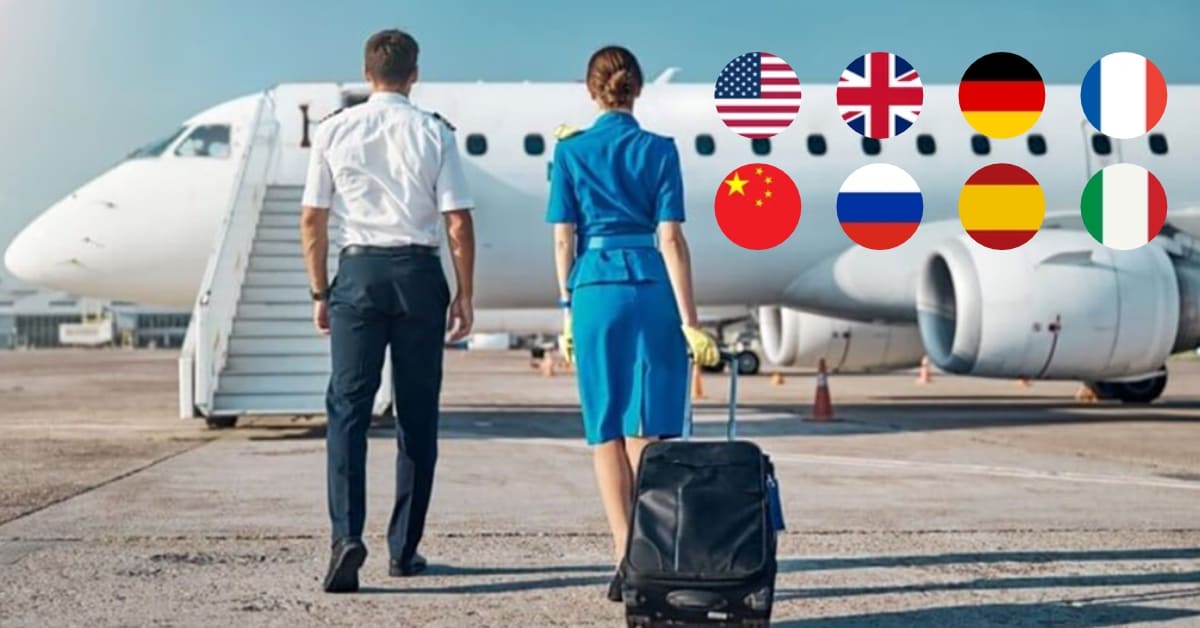The Role of Foreign Language Skills in International Airline Careers
Posted on : 6 November, 2025 5:45 pm
Working for international airlines can be a thrilling and rewarding profession, particularly for those who enjoy traveling, multicultural settings, and international operations. One of the questions that have often been asked is whether knowledge of foreign languages is required to work with international airlines. The short answer is: not always a must, but often very useful. Depending on your position and the airline’s route network, knowledge of a foreign language can be a useful asset or a hard requirement.
This article explores the importance of foreign language skills in various international airline roles, the benefits of language proficiency, and how it can enhance your career prospects.
Understanding the International Airline Environment
Global Reach and Diversity
International airlines operate across multiple countries, serving passengers from diverse linguistic and cultural backgrounds. The staff is expected to:
- Communicate effectively with international passengers
- Work in multicultural teams
- Handle emergencies and customer service issues across language barriers
- English as the Aviation Language
- English is required by the International Civil Aviation Organization (ICAO) as the official language of aviation. As a result, in most international airline jobs, English proficiency is not open to debate.
Positions Where Foreign Languages Matter
Although English is the main aviation language, some positions enormously benefit—or even necessitate—other language proficiency.
Cabin Crew (Flight Attendants)
Language Expectations
Flight attendants are sometimes the first human interaction that passengers have. Some international airlines ask cabin crew to be able to speak one or two foreign languages, particularly ones they often serve in their largest destinations.
Examples:
- Qatar Airways or Emirates tend to favor multilingual applicants.
- Air France might ask for French and English proficiency.
- Lufthansa might require German and English proficiency, with a second or third language being a plus.
Why It Matters
Responding to passenger demands in their own language
Responding to medical emergencies and providing safety instructions
Delivering personalized and culture-specific service
Ground Staff and Customer Service Representatives
Multilingual Communication
Ground staff, ticketing staff, and customer service representatives at an international airport speak to passengers from the world over. Familiarity with foreign languages can facilitate:
- Clarifying visa or boarding procedures
- Handling complaints effectively
- Guiding passengers around the airport
- Language Requirements
- Not invariably required, but highly desirable for busy international airports.
- Airlines serving multilingual areas tend to favor applicants with local and foreign language proficiency.
Pilots and Air Traffic Controllers
English: The Standard
According to ICAO requirements:
All air traffic controllers and pilots are required to be ICAO Level 4 English proficient at least.
Other Languages
Although not obligatory, familiarity with other languages may prove useful for pilots in the event of a layover or flying in countries where English is not widely spoken. All in-flight and communications procedures are, nonetheless, done in English.
Engineers and Technicians
Technical Language
These positions are more technical knowledge-oriented and exacting. Communication is primarily internal within the team or with maintenance operations.
English is required for reading manuals and technical publications.
Other languages are not typically necessary but can be helpful when collaborating with international suppliers or teams.
Management and Corporate Roles
Global Coordination
Aviation management, operations, marketing, or finance jobs at international airlines tend to involve dealing with international partners, stakeholders, and suppliers.
Proficiency in several foreign languages can be an edge.
Especially valuable for jobs that include international negotiations, contractual agreements, or expansion.
Advantages of Foreign Language Knowledge in Aviation
Even if not obligatory, foreign language knowledge has several advantages in an aviation profession.
Improved Employability
Airlines typically receive thousands of job applications.
Being multilingual makes you stand out and improves your prospects of being employed.
Career Advancement Opportunities
- Language proficiency could enable positions on certain international routes.
- Potential for upgrades to supervisory or international liaison roles.
- Improved Customer Service
- Passengers feel more relaxed and appreciated when addressed in their own language.
- Could result in improved customer satisfaction and word of mouth.
- Handling Emergencies
- In emergencies, prompt and accurate communication can save lives.
- Knowledge of passengers’ concerns in various languages is value-adding to the team.
How to Build Language Skills for a Career in an Airline
Formal Education
Enroll in language classes in high school, college, or online websites.
Study languages frequently encountered when traveling abroad: Spanish, French, Mandarin, Arabic, German, etc.
Language Certifications
Get certified (e.g., DELE for Spanish, DELF for French, TOEFL or IELTS for English).
These can add muscle to your resume and demonstrate your fluency.
Practice in Real-Life Environments
Participate in language exchange programs or apps.
Practice talking with native speakers, watch world media, or travel internationally.
When Foreign Language Skills Are Not Required
Although useful, foreign language abilities are not essential for all jobs:
Technical careers such as engineers or baggage handlers are not necessarily in need of other languages.
English-only positions do still exist, particularly in English-language nations or back-room activities.
But as the world becomes more globalized, even non-customer-confronting jobs will find multilingual communication useful in cross-border collaborations or paperwork.
Conclusion
In the international airline world, foreign languages are not always a hard and fast requirement, but they are frequently a key asset—and in certain positions, a downright necessity. While English is still the international language of aviation, being multilingual can really make a difference to your job prospects, compensation, and performance in a lot of aviation careers.
If you dream of working for an international airline—particularly in customer contact roles such as cabin crew, customer service, or ground staff—picking up one or more foreign languages is definitely a good idea. Not only does it enlarge your professional world but also makes you a better, more confident member of the global aviation community.
Let me know if you’d prefer this in PDF or editable version, or a version specifically for a given job or airline.

